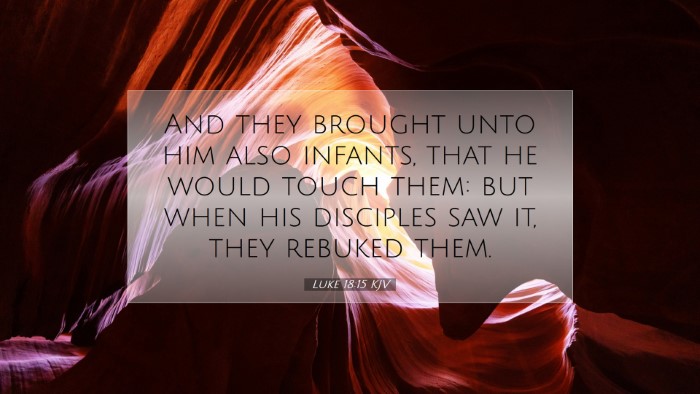Commentary on Luke 18:15
Luke 18:15 states: "And they brought unto him also infants, that he would touch them: but when his disciples saw it, they rebuked them." This verse presents a significant moment in the ministry of Jesus, highlighting His relationship with children and the broader implications of His teachings regarding faith and humility.
Contextual Background
In the Gospel of Luke, Jesus consistently emphasizes the importance of children as central figures in His teachings. The cultural context of the time placed less value on children compared to adults. It was common for adults to see children as lesser, but Jesus subverts this view, offering a counter-cultural perspective that values all individuals regardless of age or social status.
Public Domain Commentaries' Insights
Matthew Henry on Luke 18:15
Matthew Henry notes the fervent desire of parents to seek Jesus for the blessing of their children. He argues that it reflects the innate understanding of human beings that children are inherently precious in the sight of God. Henry emphasizes the following key points:
- Importance of Childlike Faith: Parents' actions symbolize a desire for their offspring to receive a blessing and spiritual awakening early in life.
- Divine Touch: Henry elaborates on the significance of Jesus' touch, describing it as a means of grace and a powerful representation of divine favor that transcends mere physical contact.
- Response of the Disciples: The disciples’ rebuke serves as a reminder of human tendencies to obstruct the innocent from coming to Jesus. Henry highlights that this is often a reflection of societal norms that undervalue the vulnerable.
Albert Barnes' Interpretation
Albert Barnes emphasizes the broader application of this passage in his commentary. He argues that this account reveals critical aspects of Jesus’ ministry and His call to all believers, particularly in recognizing the worth of every individual:
- Inclusivity of Jesus' Ministry: Barnes points out that the act of bringing infants to Jesus was a powerful demonstration of inclusivity, showcasing that Jesus welcomed all, regardless of their status or maturity.
- Teaching on Humility: He connects this incident to Jesus’ broader teachings on the necessity of humility, illustrating that one must receive the kingdom of God like a child—innocent, open, and trusting.
- Caution Against Obstruction: Barnes highlights a crucial warning against the tendency of religious leaders to prevent access to Christ, indicating that it reflects a misunderstanding of the nature of faith.
Adam Clarke's Exposition
Adam Clarke provides a detailed investigation of the variables influencing this event. He delves into the socio-religious context and offers several insights:
- Cultural Perception of Children: Clarke informs us that in the first-century Judea, children had minimal societal value. His analysis reveals the radical nature of Jesus’ acceptance of even the least of society.
- Parental Responsibility: He emphasizes the essential role of parents in introducing their children to faith, noting that the act of bringing them to Jesus demonstrates a proactive approach to nurturing spiritual lives.
- The Role of the Disciples: Clarke discusses how the disciples, arguably acting from a place of misguided zeal, inadvertently showcased the need for transformation within themselves regarding their understanding of Jesus’ mission.
Theological Implications
This passage provokes a variety of theological reflections that resonate with contemporary audiences. The importance of children in the faith must be considered with serious intent, as Jesus consistently highlights their value.
Covenantal Perspectives
Many traditions emphasize the concept of covenantal parenting, where the community's faith extends to future generations. This verse underscores the church’s role in supporting parents and families in their spiritual journeys. The act of bringing children to Jesus can be seen as a communal responsibility, reflecting the broader need for a nurturing environment in congregates.
Faith and Innocence
The theme of faith mirroring the innocence of children has profound implications. The image of a child signifies utter dependence and trust, qualities that Jesus commends. In today’s context, believers are called to recapture this childlike faith that transcends cynicism and the distractions of adult complexities.
Sociological Reflection
This passage challenges societal values and norms that often overlook the marginalized or those deemed less significant. Yet, Jesus’ welcoming invitation to children provides a model for how communities of faith should operate, centering values of accessibility and unconditional love.
Conclusion
Luke 18:15 serves as a pivotal reminder of Jesus' radical approach to ministry—a ministry that emphasizes the worth and significance of every individual, including children. Through the insights of Matthew Henry, Albert Barnes, and Adam Clarke, we gain a broadened understanding of the theological, cultural, and social dimensions invoked in this passage. It beckons each of us, pastors, students, theologians, and scholars alike, to engage deeply with the implications of Jesus’ ministry for our understanding of faith, community, and the Kingdom of God.


